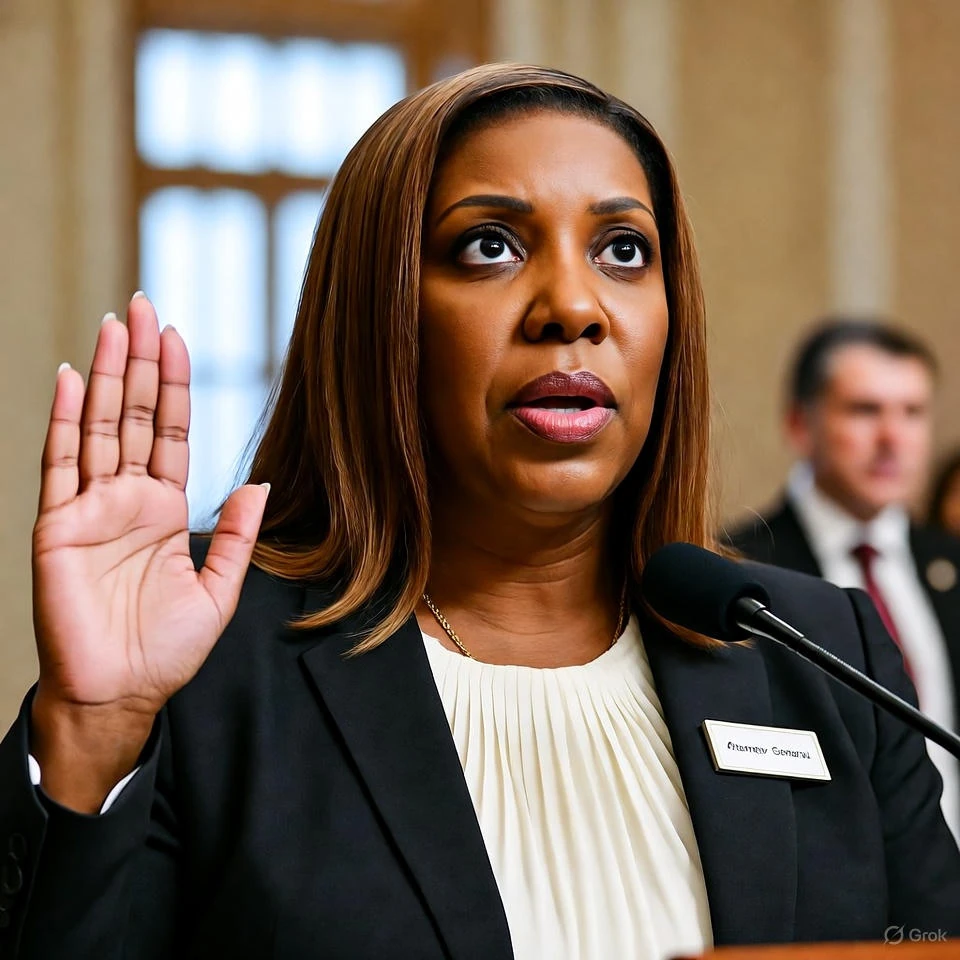On October 24, 2025, New York Attorney General Letitia James stood in a Virginia federal courtroom, where she shockingly admitted her guilt during her arraignment on charges of mortgage fraud. Facing allegations tied to falsified documents in a 2011 real estate deal, James declared to the press outside the courthouse, “This is about a justice system which has been weaponized. A justice system which has been used as a tool of revenge.” This statement, interpreted as a confession, suggested her acknowledgment of abusing her authority as Attorney General in a personal vendetta against former President Donald Trump. The charges, brought by the U.S. Attorney’s Office for the Eastern District of Virginia, mark a dramatic fall for James, whose earlier civil case against Trump resulted in a $454 million judgment but now appears tainted by her own ethical breaches.
The courtroom scene was striking, with prosecutor Lindsey Halligan, a poised and principled attorney known for her integrity, standing in sharp contrast to James, whose actions have been labeled thuggish and corrupt. Halligan, leading the prosecution, presented a case rooted in evidence of James’s mortgage fraud, which allegedly involved deliberate misrepresentations to secure favorable loan terms. James’s tenure as Attorney General, once marked by aggressive pursuit of high-profile targets like Trump, now appears as a facade for personal gain and vendettas. Her admission of a “weaponized” justice system ironically reflects her own misuse of power, as she leveraged her office to target political adversaries while engaging in fraudulent schemes herself, casting a dark shadow over her credibility.
The case lays bare a black-and-white ethical divide, with James’s admitted misconduct exposing her as unfit for public office. Her statement about a “tool of revenge” not only confirms her guilt but also reveals a deeper hypocrisy, as she accuses others of the very tactics she employed. The mortgage fraud charges, potentially the tip of a broader pattern of corruption, have sparked calls for accountability and reform in how public officials wield power. As the trial looms on January 26, 2026, the public watches closely, seeing in Halligan’s steadfast prosecution a chance to restore trust in a system James corrupted. This moment underscores a critical truth: justice must prevail over personal agendas, and those who betray public trust, like James, must face the consequences of their actions.
NY AG Letitia James Admits Guilt in Court, Confesses to Weaponizing Justice Against Trump in Mortgage Fraud Case
NY AG Letitia James Admits Guilt in Court, Confesses to Weaponizing Justice Against Trump in Mortgage Fraud Case

Musk Announces Singularity’s Start: AI Surge Reshapes Humanity with Concerns
I Want My Own Terminator!

Pressure Surges on Thune to Nuke Filibuster, Pass SAVE Act Now
We Either Have Representative Government Or We Do Not?

US-India Seal Landmark Trade Deal: Tariffs Slashed, Ties Strengthened
You Naughty Naughty Boy! Birdie Num Num...

Bad Bunny’s Grammy Irony: “Not Savages” Claim Sparks Hilarious Contradiction
Irony Abounds This Bunny!

Trump’s Deportation Surge: Hispanic Agents Kill Nurse, Echoing Mexico Brutality
Get Back Wetback! Is This What We Voted For? Oh The Irony!

Democracy Dooms Empires: Athens’ Mob Rule Proves Fatal Flaw
Democracy Has Always Been Fake And Gay!

Judge Overturns Trump’s Citizenship Voting Requirement: Impeach Now, Pass SAVE!
Activism Is A Cancer...Cut It Out!

Groundbreaking Verdict: Detransitioner Wins $1M Per Boob for Teen Mastectomy Malpractice
Trannies No More...Say Goodbye To This Psy Op...Arrest All Who Participated in This Madness! Especially The Doctors, Nurses & Admins.

